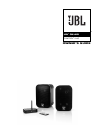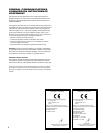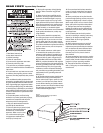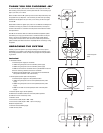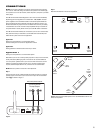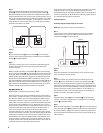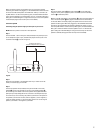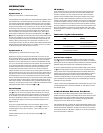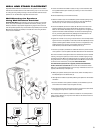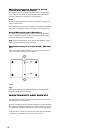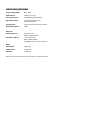
8
Adjusting the Volume
Application 1
Adding surround speakers to a home theater system:
In this application, the output level of your Control 2.4G active speakers will not
only be dependent on the volume setting of your A/V source; it will also need
to be properly adjusted after installation and before use in order to be able to
work correctly with the other speakers in your multichannel surround system.
To adjust the output level, turn your A/V source on, set your A/V source’s volume
control about a third of the way up, and activate the speaker-level-adjustment
test tone. Make sure that the Control 2.4G transmitter and speakers are on,
both of its speakers are connected, and there is RF lock (i.e., lower LED on
active speaker is solid green). Using the Control 2.4G remote control 1 and
2 adjust the volume level of Control 2.4G until its output level is balanced with
the rest of the speakers in your surround system. From this point on, you will
not be using the remote control of your Control 2.4G for volume settings. You
will be increasing and decreasing the output level for the entire surround
sound system using your A/V source’s volume control. Please note that Control
2.4G will retain its volume setting when it is in standby, so there is no need to
set its volume level every time the system is turned on.
Application 2
Adding speakers to remote locations around your home:
Depending on the type of connection and the specific source that you are
using, the volume setting on your receiver may affect the sound output level of
your Control 2.4G. To check whether the output from your source is volume-
dependent, turn the volume level on your receiver to approximately half-way.
Turn on your Control 2.4G transmitter and active speaker. Once the lower LED
on the active speaker lights in solid green, indicating that RF lock has been
achieved, verify that there is sound output from the active speaker. Then
increase and decrease the volume control on your receiver and observe
whether this affects the sound output from your active speakers. If it does not,
then the volume control on your source unit can be set at any position that you
may desire, as it does not affect the performance of Control 2.4G. If changing
the volume setting on your source does affect the output from Control 2.4G,
then you will need to always keep your source’s volume control at about half-way
up with audio receivers or A/V receivers, at about three-quarters of the way up
when using a computer, and at maximum if using a portable audio device. From
this point on, you will use the remote control included with the JBL On Air Control
2.4G wireless speaker system to adjust volume
1 and 2.
Local Input
The JBL On Air Control 2.4G wireless speaker system also includes a local
input 8 on the rear of the active speaker. This input allows you to hook up
a portable audio player directly to the speaker wherever you may happen to
be. For example, you could have the system connected to your receiver as
described in Application 2, listening to a local FM station and then hook up
your portable music player to the local input and switch between the two
different sources.
T
o connect a portable audio player to the active speaker
, simply connect
the preamp out, line out or headphone jack to the line-in
8 on the rear of
the active speaker using a 1/8-inch mini-jack – 1/8-inch mini-jack cable
(not included).
To switch between the two sources, push the input button 3 on the
remote control.
ID Codes
In the unlikely event that you experience interference when operating the
system, or if you have more than one set of Control 2.4G transmitters and
receivers in operation, you may change the channel in which the system
operates. On the transmitter module and the active speaker, there is a four-
position “ID Code” selector. Simply set the selectors to one of the other
positions. The transmitter and active speaker must be set to the same position
in order for the system to function correctly. You can also set up a maximum
of two pairs of speakers to be receiving from the same transmitter by setting
the channel selector on the transmitter and both of the active speakers to the
same channel. Please note that the two active speakers need to be at least
10m (33 feet) apart, or reception and operating range in one or both units may
be degraded.
Indicator Light Information
Power Indicator LED Input LED
(Top) (Bottom)
Green System is on Transmitter and speaker are
communicating (RF lock)
Blinking Green Receiving IR command Transmitter and speaker are
from remote control not communicating (no RF lock)
Red Standby
(no signal being received)
Orange Local input is selected
Subwoofer Output
The JBL On Air Control 2.4G wireless speaker system includes a subwoofer
output 7 on the rear of the active speaker. This output allows you to feed the
low-frequency sounds to a separate powered subwoofer. A powered subwoofer
will deliver deeper bass response than is possible with speakers alone.
To connect a powered subwoofer to the active speaker, simply connect the sub-
out
7 on the active speaker to the line-in on the rear of the powered subwoofer
using a 1/8-inch stereo mini-jack/dual-RCA cable (not included*). Please note
that this output is full-range and not filtered or low-passed. Make sure that your
powered subwoofer features a low-pass crossover network and that this
crossover is indeed selected. Do not use the LFE input on a powered subwoofer
as it is not filtered and you will be hearing a lot of undesirable higher frequency
information from your subwoofer.
* Only one stereo mini-jack/dual-RCA cable is included with the system. If you
are following Application 2, Connection Option B, you will need to purchase
this additional cable.
A Word About Wireless Products
The JBL On Air Control 2.4G wireless speaker system utilizes advanced
wireless transceivers operating in the 2.4GHz frequency band. This is the same
frequency band that is used for wireless home networks and high-quality
cordless phones. It also allows for the transmission of high-performance,
full-spectrum sound to remote locations, wirelessly.
Like all wireless devices, the JBL On Air Control 2.4G wireless speaker’
s oper-
ating range may vary depending upon variables such as building construction
methods and materials, atmospheric conditions and other sources of interfer
-
ence. Please consult your JBL dealer or distributor
, or visit us at www.jbl.com
for further information or assistance.
OPERATION



